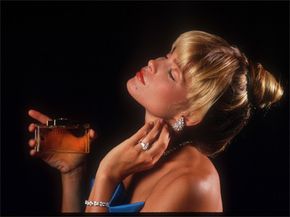Perfume Chemistry
Why is perfume so diluted? It's not that manufacturers are stingy. The reason is actually aesthetic: Lots of alcohol spreads out the smells so that you can distinguish them. In a perfume oil, you'd encounter a jumble of smells. Smelling it would be like hearing an orchestra play all the notes in a symphony at once. You might register that you're smelling something sweet, but not that it's mango, followed by jasmine, finished with cherry. Its diluted nature makes the smell enjoyable.
In fact, most perfumes are engineered to have a three-part smell, which unfolds after you apply it to your skin. You smell top notes within the first 15 minutes of applying. These chemicals first evaporate off your skin. Designers often put weird, unpleasant or spicy smells in this phase so that they interest you but don't hang around long enough to offend. Heart notes appear after 3 to 4 hours. The chemicals creating these smells evaporate more slowly from your skin. They're probably what you remember about the perfume; if it's a floral perfume, flowery smells go here. Base notes stick stubbornly to your skin. You smell them within 5 to 8 hours of application [source: Sell]. Musky, watery, mossy and woody chemicals often go in the base [source: Calkin]. The word note is just perfume jargon for an individual smell.
Advertisement
Knowing that perfumes smell by evaporating, you can take better care in applying them. When applying, spread the perfume, but don't rub it in vigorously, because the heat you create will evaporate the top notes and weaken the overall smell.
Chemical reactions can also morph your perfume on the shelf. Visible light has enough energy to bust the bonds in fragrance molecules, and bright sun will singe your perfume in as little as a week [source: Turin and Sanchez]. Air can also corrode your fragrance by oxidation -- the same process that turns uncorked wine into vinegar. Storing your perfume at room temperature, in the dark and in a spray bottle preserves it well. Then, it will have a shelf life of at least two years [source: Sell].
But what about your chemistry? Your temperature and oiliness seem most important. The top notes will evaporate faster from warm and dry skin than cool and oily skin. Otherwise, by the time the heart notes emerge, the perfume smells the same on everyone [source: Turin and Sanchez].
You have learned about your perfume's structure and behavior. You have spread, but not rubbed vigorously. Next, we'll look at how the fragrance industry produces the stuff.
